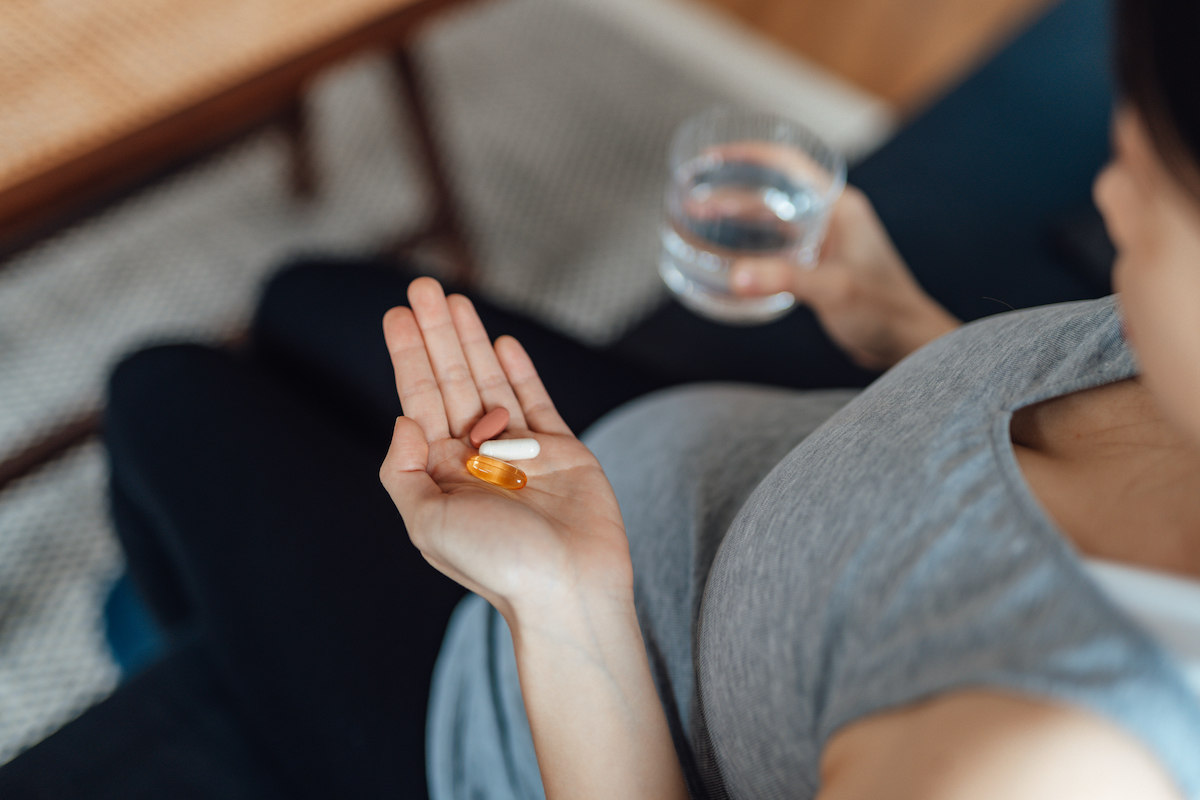A 2022 study in the New England Journal of Medicine showed convincing evidence that vitamin D supplementation did not reduce the risk of fractures in older adults. The study was a large randomized trial, exactly what we want for our “gold standard,” and the results are clear. This particular trial also looked at impacts on other outcomes, like cancer and heart disease, and found nothing. There are other trials, and they show the same thing. We have no convincing evidence that routine vitamin D supplementation does anything at all. The study — along with all the other evidence — prompted headlines like “Stop Taking Vitamin D Already.”
Vitamins are a stark example of where the confusion between correlation and causation can lead us astray. Consumption of vitamin supplements on a routine basis is very highly associated with other health behaviors. I’ve written about this before, in the newsletter and in my academic work.
One thing I found, looking at vitamin E specifically, is that it is not just that consumption of vitamin E is more common among a select sample of people. It’s also that when the advice about whether to take the vitamin changes, the people who respond to that advice (either taking it more if it’s now recommended, or not taking it when it’s less recommended) are not representative of the general population. I show, for example, that when vitamin E is more recommended, it also appears to be highly correlated with lower death rates. But that’s not because it reduces death; it’s because when you tell people to take vitamin E, the people who take up that recommendation are also engaged in other health behaviors.
Given this, it is perhaps not surprising that when researchers study virtually any individual vitamin supplement, they tend to find … nothing. Like here, with multivitamins. Or the aforementioned vitamin D results.
And yet! A lot of people take vitamins, or give their kids gummy vitamins, or think of vitamins as healthy. The result is that when we talk about vitamins, our default is often that vitamins are beneficial. We may be accepting of the idea that the evidence doesn’t support it in some individual case, but “vitamins are good for you” is where we begin.
In fact, given what we know, I would suggest we need to flip our starting point. We should assume that for the most part we do not need vitamin supplements. And then we can ask: Are there any exceptions to that? Today’s post will, therefore, take that frame. Let’s begin by assuming that mostly you do not need vitamin supplements. What are the situations in which that’s not true? I’m going to suggest that there are really only three: specific deficiencies, pregnancy, and infancy.
Reason 1 for taking vitamins: You have a severe deficiency of a particular vitamin
Humans need vitamins to survive. For example: an extreme deficiency of vitamin C can cause scurvy. You’re probably familiar with that from 16th-century ocean voyages. Without fresh food, sailors who were gone for months or years developed severe vitamin C deficiency. Scurvy is bad — your gums bleed, you bruise easily, there is fatigue and rash. It can cause death. Similarly, a severe deficiency of vitamin D can cause rickets in children, a bone issue that results in bowlegs. An extreme lack of vitamin A can cause blindness. And so on.
However: these severe deficiencies are very rare in the current developed world setting, largely because you do not actually need that much of each vitamin. Eating a handful of ketchup packets every day would be enough vitamin C to ward off scurvy. A typical Western diet, even one for a child who seems picky, will have plenty of vitamin A. To be clear, we do see severe vitamin deficiency issues in many developing countries, where vitamin supplementation for children is still needed. But this isn’t broadly the case in the West.
Vitamin D deficiency in childhood is the one case where — perhaps — there is more reason to be concerned. Having said that, a lot of foods are now supplemented with vitamin D for this reason (including, say, milk). So again, your child is likely to currently have a fine amount of vitamin D.
There are certain genetic conditions or illnesses that inhibit the ability to absorb vitamins, in which case supplements may be necessary. And for people who have had bariatric surgery, vitamin supplementation is often needed, since food consumption is more limited. There are occasional cases of scurvy in the U.S. each year, primarily among older smokers living in extreme poverty and experiencing homelessness, who may have no access to fresh food at all. So none of the above is to suggest that there isn’t a role for vitamins in specific situations.
It is important to note that just because we need some amount of each vitamin to survive does not mean more is better. You do not get even less scurvy if you take more vitamin C. Taking huge doses of vitamin A will not help you see better (and is, in fact, dangerous). In a sense, this is what we have learned from all of these studies of vitamin supplements. Just because a small amount is vital and lifesaving doesn’t mean more is better.
So: reason 1 to take vitamin supplements is if you have a diagnosed severe deficiency in a particular vitamin, probably as a result of an illness or genetic condition or due to extreme deprivation (poverty, homelessness).
Reason 2 for taking vitamins: You are pregnant or planning to become pregnant
During pregnancy, and before, prenatal vitamins are recommended. There are two basic motivations for this: folic acid (or folate) and possibly iron.
Folate is a nutrient found in food that is essential for infant development. When pregnant women are deficient in folate, it can lead to an elevated risk of neural tube defects (conditions that affect the spinal cord and brain). Folate levels can be increased by taking either folic acid or folate directly in prenatal vitamins. (I have written before about the question of whether folate is “better.” The short version is that it might be for some people, but we don’t have a lot of strong evidence proving that.) There is good randomized-trial evidence showing a reduction in neural tube defects with folic acid supplementation. So if you are pregnant or planning to become pregnant, take a supplement.
Pregnancy can also lead to anemia. This doesn’t happen for everyone, but it’s more common than when not pregnant. If you’re anemic (primary symptom: being tired; detection: blood test), iron supplements can help.
Prenatal vitamins, as typically developed, do contain both folic acid (or folate) and iron. They also contain other things, like vitamin E and D and biotin and so on. You don’t need those! (Unless you have a specific vitamin deficiency; see above.) Some people have trouble tolerating large prenatal pills. As long as you are getting the folic acid and iron — which you can get in smaller, specific pills — you are getting the vitamins you need.
A note: This discussion applies to pregnancy and the period before pregnancy when you can build up folic acid. Prenatal vitamins are not necessary during breastfeeding.
Reason 3 for taking vitamins: You are a breastfed baby
Vitamin D deficiency in childhood can lead to rickets. This is not a significant issue in the developed world, but it still causes concern. For older kids, many foods have vitamin D added to make sure the levels are high enough. For infants who are consuming only breast milk, the concern is that if their mothers have low vitamin D levels, they will not get enough. The solution is vitamin D drops.
There is no direct evidence that vitamin D supplementation in infants leads to lower rates of rickets. There is evidence that it increases vitamin D concentration, but that’s mechanical, and we don’t have clear direct evidence of the next step — bone growth and health.
Having said that: rickets is less obscure than scurvy, and breastfed babies have no other source of nutrients. So I can see an argument for vitamin D drops, although if you forget for a day (or two), I definitely would not panic.
But what about…
I can anticipate some of what I will hear back on this, since people really, really believe in vitamins. So a final word: I am not saying you cannot keep taking your vitamins!
Taking vitamins might be the right thing for you. Many of us do things in service of our health that we think work, without hard evidence for it. For example, my father eats chia seeds every day even though I have repeatedly told him they do nothing. (Just last week he sent me a trial about chia seeds and type 2 diabetes, a disease he does not have. Hope spring eternal!) Right now, I am rolling my foot on a spiky ball that I am convinced will fix my foot problems, even though deep down I know that the main problem is that I’m too old to run 35 miles a week without stretching adequately.
Maybe these things actually work for us; who knows? After all, the placebo effect is strong. If you feel like a multivitamin works for you, there is no harm in taking it. But there is also no demonstrated benefit. Our approach to the data should take that as the starting point.
There is a fantastic book called Vitamania on the history and nutritional impacts of vitamins — if you want to go deeper on the subject, check it out.
Community Guidelines















